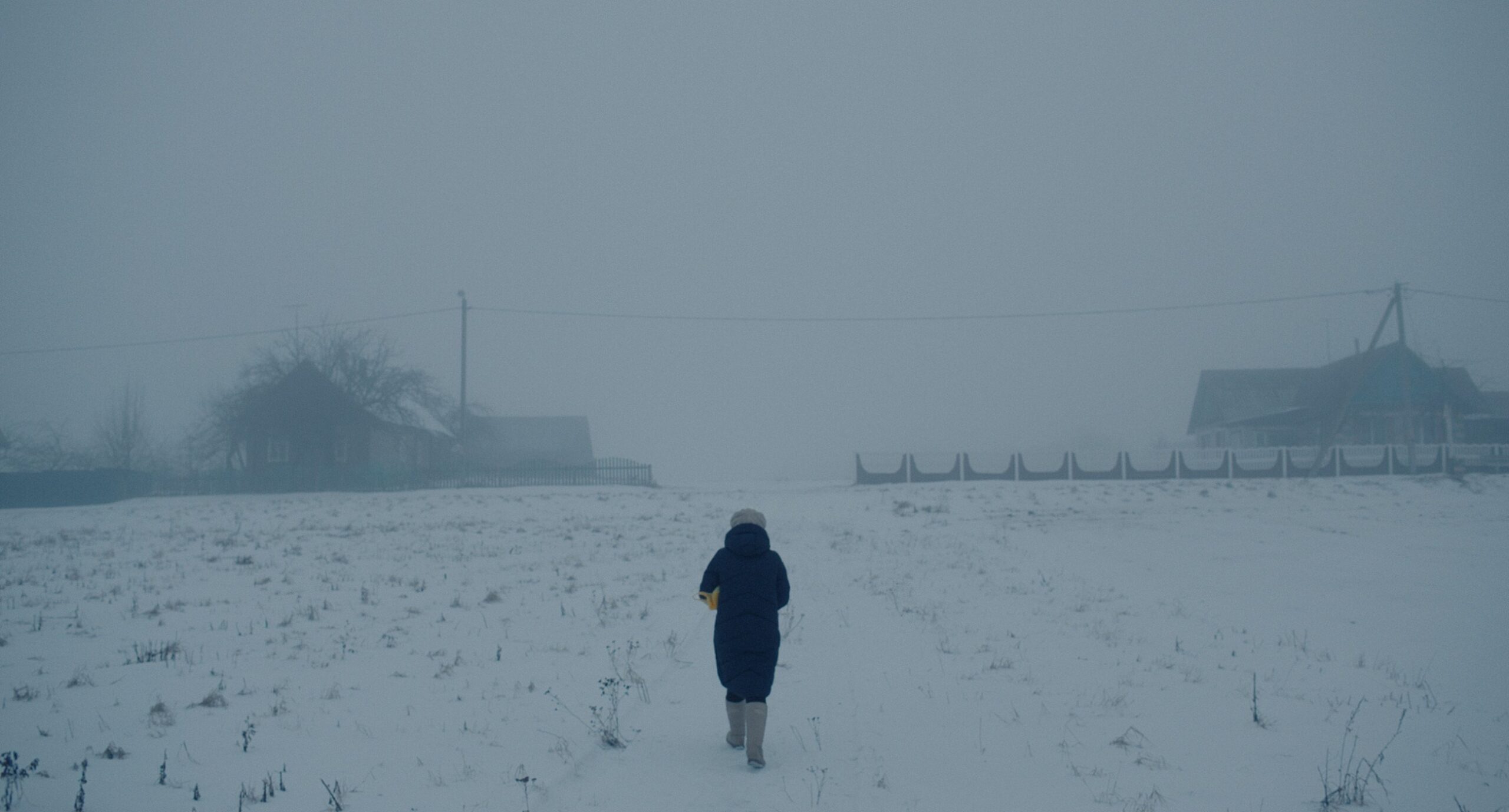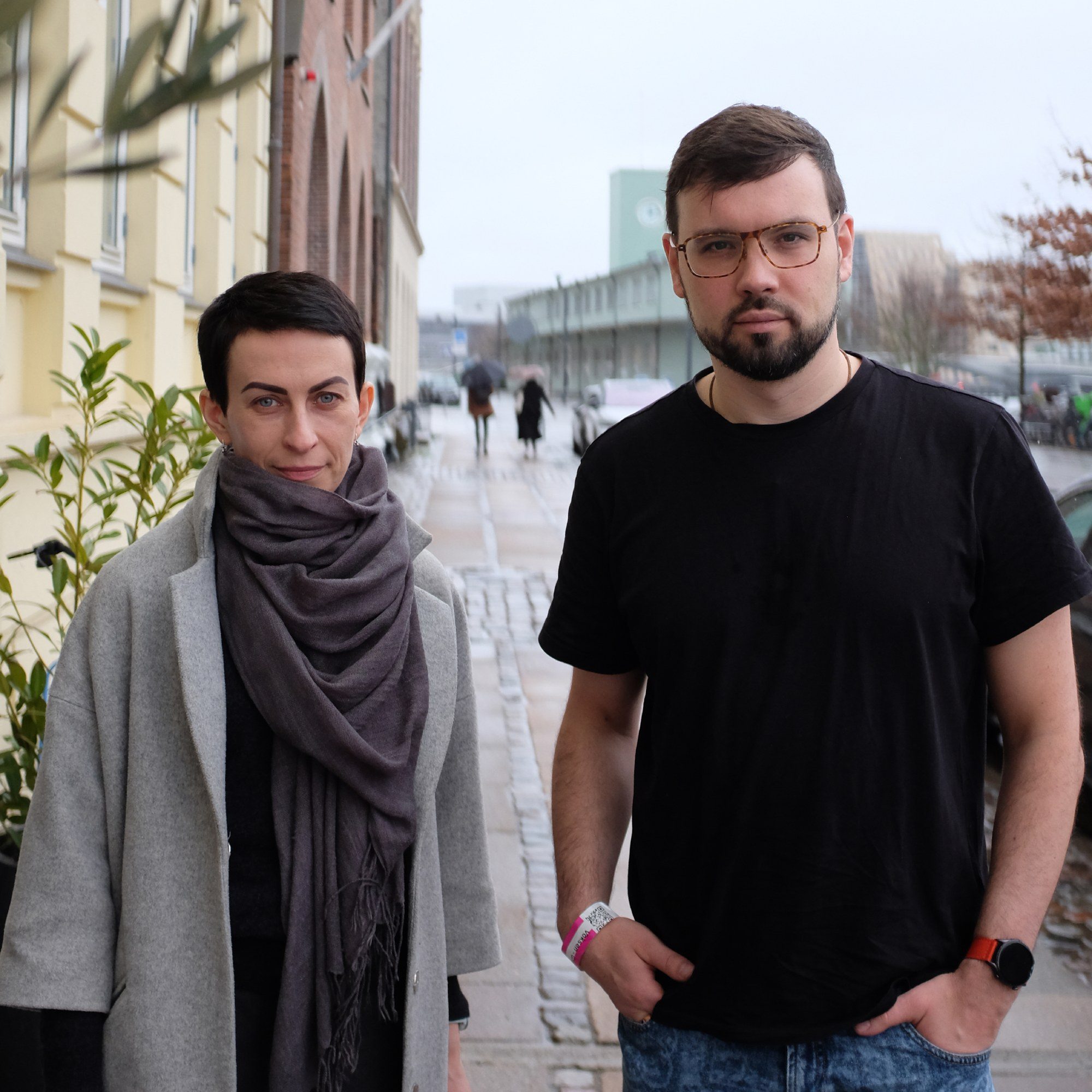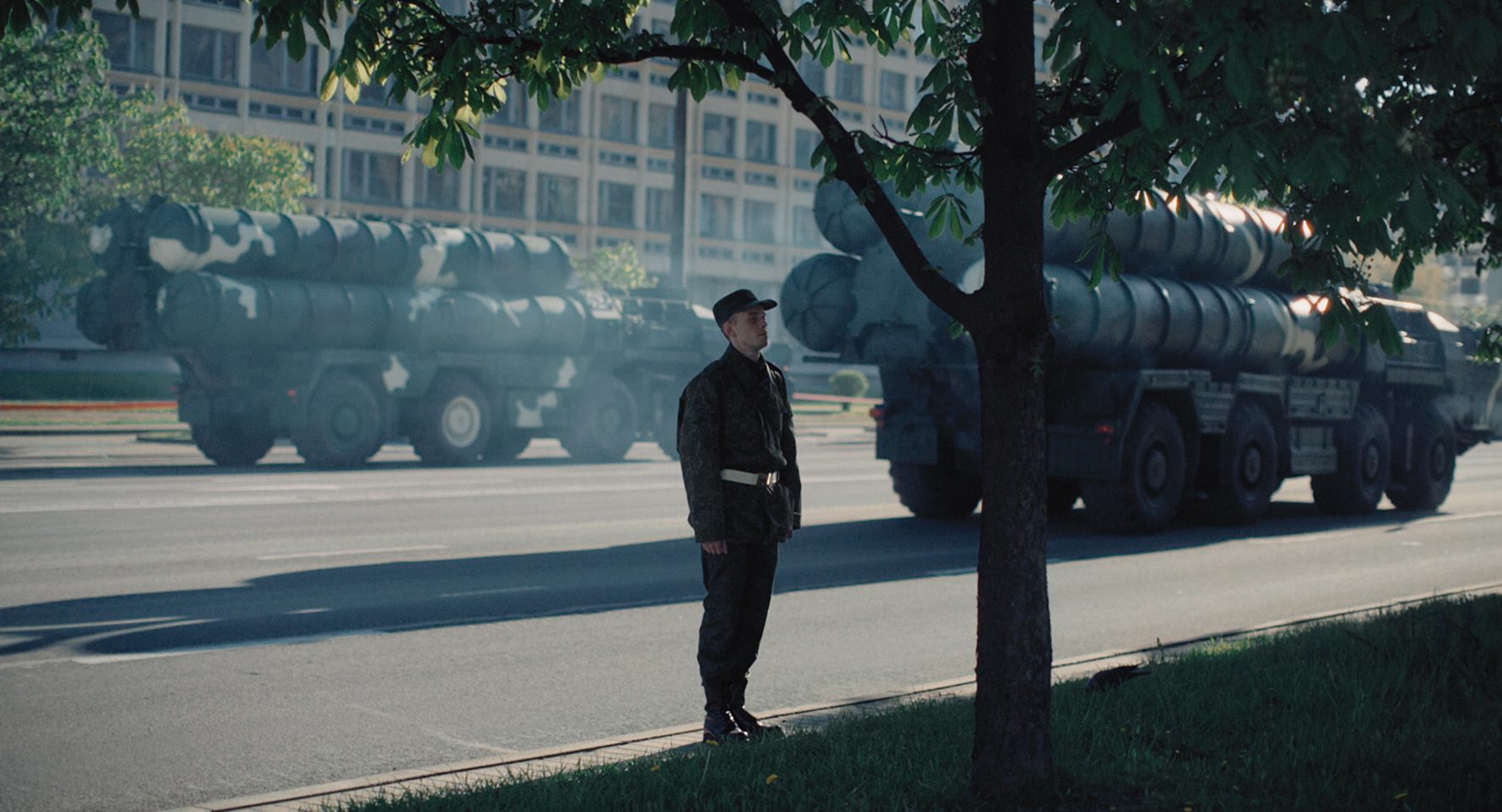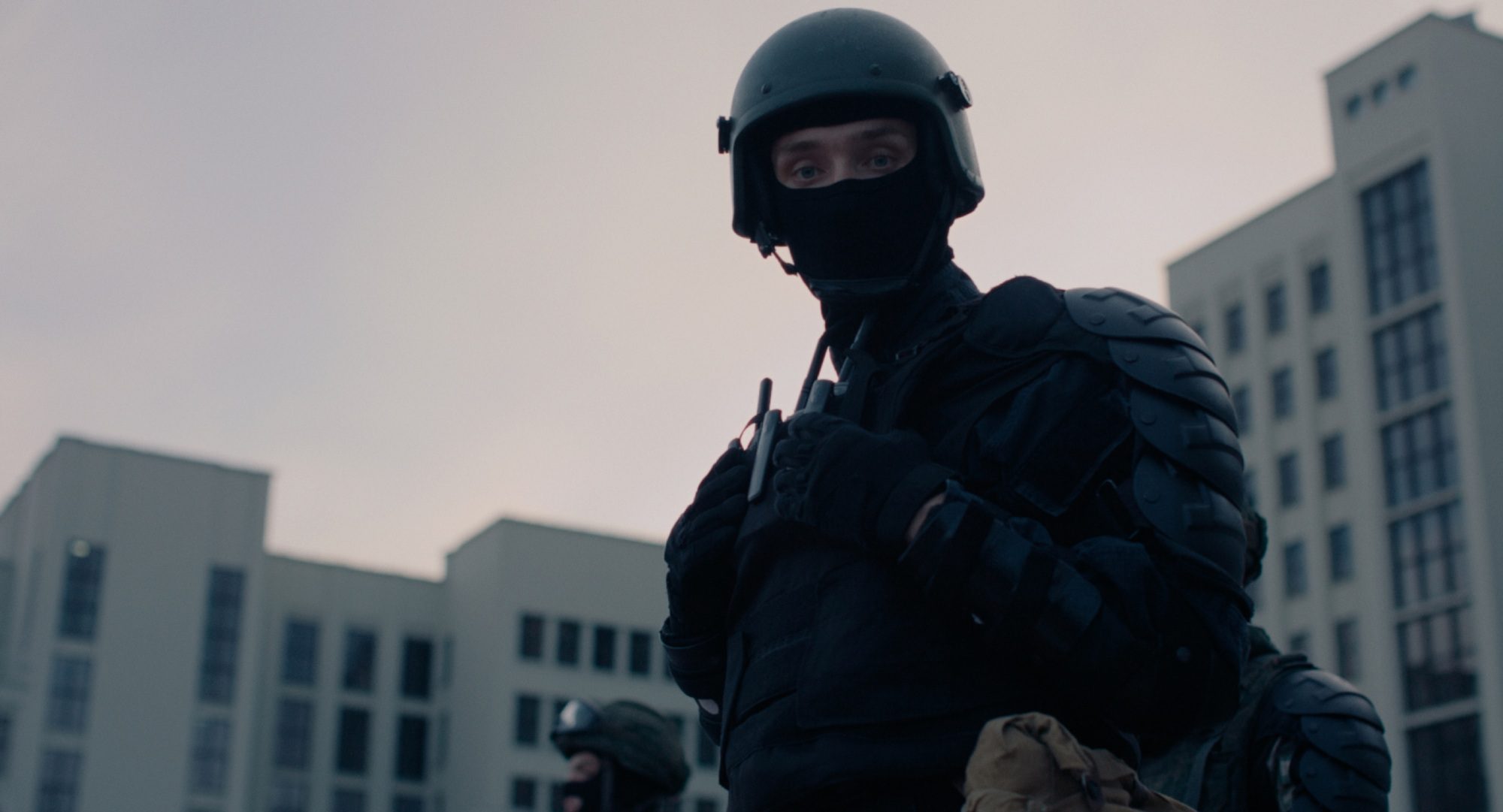The film Motherland by Belarusian directors Ganna Badziaka and Aleksander Mikhalkovich won the main prize of CPH DOX, one of Europe’s most influential documentary film festivals. This film tells the story of a mother whose son was killed for hazing in the Belarusian army and the youth who go to protests against Alexander Lukashenko in the distant 2020. The editor-in-chief of Zaborona, Kateryna Sergatskova, met with the film directors during the festival and talked about the possibility of Belarusian resistance and how the Russians gradually seized power in the country.
The main character of the film Motherland is Svetlana. Her son was found dead while serving in the army. As she tries to shed light on the culture of violence and abuse in the Belarusian army, a group of young friends from the Minsk techno-underground are drafted into the military at the same time as mass protests over a fraudulent presidential election. The filmmakers of Motherland record a historic moment of resistance, shortly after which they, like thousands of Belarusians, were forced to leave their native country due to repression.
You released a movie called Motherland. By the way, how would you translate its name into Belarusian or Ukrainian?
Aleksander Mikhalkovich: The film sounds in English and combines meanings. That’s why Motherland. “Family” in Belarusian does not have two meanings, as in English: country-mother, because the main character is a mother and motherland as the motherland.
In this film, you tell the story of Belarusian youth who found themselves in the situation of protests in 2020. At the same time, young people must join the army, defend their homeland, and face internal and external conflicts. More than two years have passed since Lukashenko effectively usurped power in Belarus. A lot has changed; the invasion of Ukraine has begun. Now how do you feel about what was in this film? How much has changed for you and your characters?
Ganna Badziaka: In fact, I would say that the usurpation of power took place much earlier because Lukashenko won only in the first elections, and for the past 26 years, everything has actually moved in this direction.
As for the defense of the homeland, this is such an inertial system that young guys fall into. It is a forced story. After 2020, and especially after Belarus was drawn into Russia’s full-scale invasion of Ukraine, this became a more pressing issue for young people and a more fundamental one. As for our heroes who participated in the 2020 protests, they left Belarus. In part, this is also a forced decision because the repression in Belarus is such that there is little choice.
A. M.: Dictatorship tends to create realities that differ from reality. I was in the army in Belarus 13 years ago. It became the basis for this film. When good artists, painters, and directors cannot function [in their country], they [usually] have a professional migration, go to the east, to Russia. Then the dictatorship fills these cavities with something. There are some fake film festivals and fake artists.
Fake patriotic, you mean?
A. M.: Yes. There is such a model of the state where these institutions must exist, and the dictatorship fills this place with fakes — the same with the army. Belarus depended on Russia constantly, and the army was sent to protect the regime and order inside the country.
G.B.: The primary function of the security forces of Belarus is the defense of the regime, not the country or its citizens.

The directors of the film Motherland are Ganna Badziak and Aleksandr Mikhalkovich. Photo: Roman Stepanovych / Zaborona
Interestingly, you have a character in the film who constantly brings up this topic. He says: “And if you are now in the army and they tell you to go and beat me because I go out to protest, will you go and beat me?” It pushes the hero to think a lot about his role in the army. Then he leaves the army, as far as I understand. Now, especially after the beginning of the full-scale invasion, we talk a lot about the participation of the Belarusians in the invasion and the possibility of resistance within the army. As people who have spent a lot of time on this topic, do you think the army of Belarus may ultimately decide not to participate in the war?
A.M.: I have my theory or view on this topic. Belarus has been pursuing a policy of Russification for the past two hundred years, and before the protests, military representatives studied in Russia, were Russians themselves, and had Russian passports. The same happened during the protests: the opposition chose – they thought it would work, and it worked for a while – a peaceful way. Many people in the army or police began to resign publicly to leave their positions. Now many are behind bars for 15-20 years for treason. They did “self-lustration” instead of taking up arms. Then all these positions — not only in the army but also in television companies and special services — were filled by Russian professionals, workers who took everything under even greater control. The scale of repression is such that [resistance] was possible two years ago but is not possible now.
G.B.: Despite Lukashenko’s lack of subjectivity in his politics, I think this is one of the reasons why Belarusian territory and resources are used in the invasion of Ukraine but not the Belarusian army. Because Lukashenko and his subordinates are afraid to use potentially disloyal people.
So, is there still resistance?
G.B.: I don’t know how much resistance there is, but it is a disagreement within.
How do you know that?
G.B.: Through communication with our heroes, their impressions of the army’s mood, and conversations with serving people.

Military parade in Minsk, 2020. A frame from the movie Motherland. Photo: Serhii Kanaplyanik
What might be the “red lines” for this to become resistance? When the army says: we will definitely not do this. What could it be?
G.B.: I think this is the army’s direct involvement in the invasion of Ukraine.
A.M.: Because some Belarusians, especially in Polissia, have relatives from Ukraine or in Ukraine, they keep in touch. It seems to me that the authorities understand this, and some people understand it. In addition, information is spread differently: Belarusians know what is happening [in Ukraine], how [Ukrainians] destroy the occupiers — and draw conclusions from this — the motivation to participate decreases.
G.B.: In addition, in Belarus, the story is entirely different. There is no imperial motivation.
Many Belarusians left during the protests — thousands of people. The question arises: Is anyone left who can offer civil resistance publicly or privately? We know that Lukashenko’s regime is much tougher than in Russia. People are not just put in prison — it is also torture and physical violence.
A.M.: Do you personally think it is possible?
I am interested to hear from you. In fact, Ukrainians rarely hear about Belarusians and what is happening in your country.
A.M.: You follow the news. For example, Belarusian partisans announced they had blown up an A-50 [reconnaissance] plane flying from [the airfield] in Machulyshchy. Then a new cycle of terrible repressions began in Belarus. They began to arrest all circles of acquaintances from [Kastusy] Kalinovsky’s regiment [a regiment of Belarusians fighting in Ukraine against Russia], all acquaintances involved in this sabotage.
But non-public acts go on. Yesterday, for example, the KGB in Grodno killed a man who had some kind of weapon and seemed to be preparing sabotage. Some people are doing something, but you understand that mass actions are impossible.
G.B.: There is no systematized resistance, but there are two aspects. The first is the holding of protest actions, which is weakly believed. But at the beginning of the invasion, there were protests in approximately twenty-five towns in Belarus, and fifteen thousand people seemed to have been arrested at that time. In parallel, there is a forced confrontation, rail, and sabotage. There was a case when a man shot a policeman — and these are actions outside the boundaries of a peaceful protest, in fact, this is a violation of the state’s monopoly on violence. But I don’t see any prospects for peaceful resistance now.
It is a difficult question, but I am still interested in what you think — what is the role of Belarus in the invasion of Ukraine? Is it an aggressor, is it an accomplice, or is it a victim?
A.M.: I would answer this question again from a historical perspective. For example, mass protests in Belarus continued for ten months. It was a reaction to mass violence. It did not shut people down, as, for instance, in Russia. On the contrary, people were provoked, which motivated them to resist, and they fought against their systemic fears of living in a totalitarian regime. The entire active skeleton was officially put [in prisons], about 2,000 people — many more people left before the war. At the time of the war, there remained a cleaned, polished army and a suppressive mass. Putin also helped Lukashenko suppress the protests. At the height of the protests, the Russian Guard went to Belarus. All law enforcement agencies were filled with Russians.
G.B.: I don’t understand now what the word “Belarus” means. The government stands alone, and it has no legitimacy and no support. Lukashenko did not receive the majority of votes in the elections, so he has no legitimacy. On the other hand, there are people. What to define as Belarus now is [a question].

A riot police officer stands in front of the government building in Minsk amid mass protests in 2020. A frame from the movie Motherland. Photo: Serhii Kanaplyanik
When it comes to Russia and the role of ordinary people who either protest and resist or don’t, this is one of the most important and difficult topics. Probably, this is also a complex topic for you — whether the Belarusians could do everything to prevent such a scenario.
G.B.: The loss of the protests certainly played a role in what we have now. In another scenario, I don’t think this situation would have happened.
It was dangerous to be a journalist in Belarus in 2020 (Zaborona wrote about female journalists who were sent to prison by the Lukashenko regime for broadcasting protests online). What was it like shooting your film? Did you risk it?
G.B.: I used to work in journalism — independent, of course, and had no business with state media. As long as I worked, I got used to the fact that you are always taking risks and don’t have any legal tools to protect yourself.
A.M.: Do you think it was risky for me to make a film about the occupation of Crimea? [Oleksandr Mikhalkevich made a documentary film, “My Grandmother from Mars,” about life in Crimea after the annexation]. The springboard for the current psychological state was laid right there. And self-censorship, and so on, with everything that follows. Well, that’s already [topic for another conversation].
So many people left Belarus, and you also left. How do you imagine your future activity? What will you shoot? How will you find yourself?
A.M.: To work as a farmer (laughs). When the war started, we were in Kyiv. I felt such emotions… I realized that no movie or literary work had prepared me for this. My favorite film, Francis Coppola’s Apocalypse Today, or Alexievich’s books don’t come close to the experience [of what’s happening]. Various projects planned before the war are also in question because the meaning of all this is lost and fades away after the start of the war. All this already seems unimportant. You also raise questions about the effectiveness of the art.
Are you disappointed in your profession?
A. M.: We will see after your interview’s publication and Ukrainian society’s reaction.
G.B.: I also don’t know if I will continue doing what I was doing. Returning to journalism might make more sense to me.








